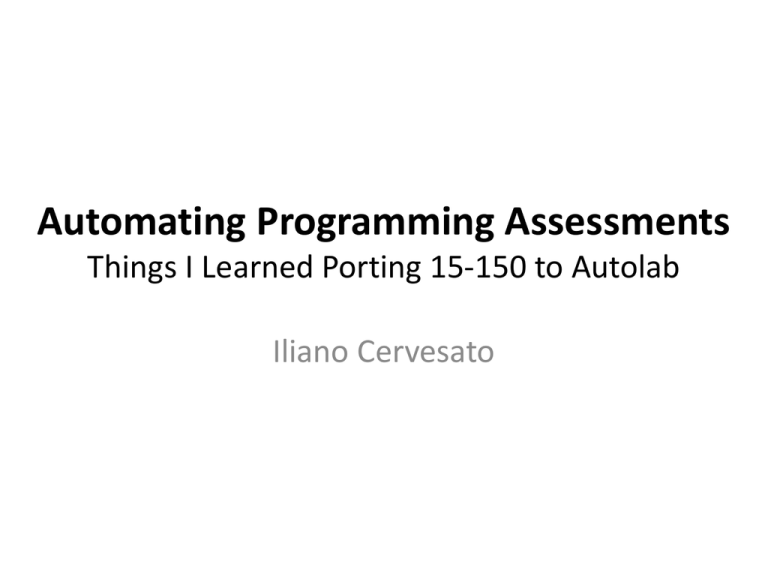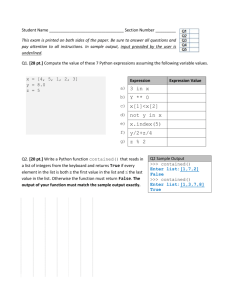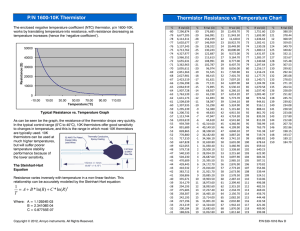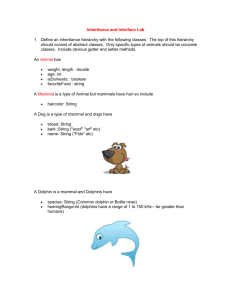Automating Programming Assessments Things I Learned Porting 15-150 to Autolab Iliano Cervesato
advertisement

Automating Programming Assessments
Things I Learned Porting 15-150 to Autolab
Iliano Cervesato
Thanks!
Bill Maynes
Ian Voysey
Jorge Sacchini
Generations of 15-150, 15-210 and 15-212 teaching assistants
1
Outline
Autolab
The challenges of 15-150
Automating Autolab
Test generation
Lessons learned and other thoughts
2
Tool to automate assessing programming
assignments
Student submits solution
Autolab runs it against reference solution
Student gets immediate feedback
» Learns from mistakes while on task
Used in 80+ editions of 30+ courses
Customizable
3
The promises of Autolab
Enhance learning
By pointing out errors while students are on task
Not when the assignment is returned
» Students are busy with other things
» They don’t have time to care
Streamline the work of course staff … maybe
Solid solution must be in place from day 1
Enables automated grading
» Controversial
4
How Autolab works, typically
Virtual machine
Submission
Compiler
Student
solution
Test cases
Autograding
script
=
Outcome
Reference
solution
5
The Challenges of 15-150
6
15-150
Use the mathematical structure
of a problem to program its solution
Core CS course
Programming and theory assignments
Pittsburgh (x 2)
150-200 students
18-30 TAs
Qatar
20-30 students
0-2 TAs
7
Autolab in 15-150q
Used as
Submission site
Immediate feedback for coding components
Cheating monitor via MOSS integration
Each student has 5 to 10 submissions
Used 50.1% in Fall 2014
Grade is not determined by Autolab
All code is read and commented on by staff
8
The Challenges of 15-150
15-150 relies on Standard ML (common to 15-210, 15-312, 15-317, …)
Used as an interpreted language
» no I/O
Strongly typed
» No “eval”
Strict module system
» Abstract types
11, very diverse, programming assignments
Grader for hw-(x+1) very different from hw-x
9
Autograding SML code
Traditional model does not work well
Requires students to write unnatural code
Needs complex parsing and other infrastructure
» But SML interpreter already comes with a parser for SML
Instead, make everything happen within SML
running test cases
establishing outcome
dealing with errors
Student and reference code become modules
10
Running Autolab with SML
Virtual machine
SML interpreter
Student
solution
Submission
Test cases
Autograder
=
Outcome
Reference
solution
11
Making it work is non-trivial
Done for 15-210
But 15-150 has much more assignment diversity
No documentation
Initiation rite of TAs by older TAs
» Cannot work on the Qatar campus!
Demanding on the course staff
TA-run
Divergent code bases
Too important to be left to rotating TAs
12
What’s in a typical autograder?
grader.cm
handin.cm
handin.sml
autosol.cm
autosol.sml
HomeworkTester.sml
xyz-test.sml
aux/
allowed.sml
xyz.sig
sources.cm
support.cm
(simplified)
A working autograder took
3 days to write
Tedious, ungrateful job
Proceed by trial and error
Lots of repetitive parts
Cognitively complex
Each assignment brings new
challenges
Time taken away from
helping students
Discourages developing
new assignments
13
structure HomeworkTester =
struct
exception FatalError of string
fun test_traverseC () = OurTester.testFromRef
(Our.treeC_toString) (list_toString Char.toString)
(op =)
(Stu.traverseC) (Our.traverseC)
(studTests_traverseC)
HomeworkTester.sml
structure Stu = StuHw04Code
structure Our = Hw04Tests (Hw04 (Stu))
fun bool_toString true = "true"
| bool_toString false = "false"
fun pair_toString fst_ts snd_ts (x,y) =
"(" ^ (fst_ts x) ^ ", " ^ (snd_ts y) ^ ")"
fun triple_toString ts snd_ts trd_ts (x,y,z) =
"(" ^ (fst_ts x) ^ ", " ^ (snd_ts y) ^ ", " ^ (trd_ts z) ^ ")"
fun list_toString toString l =
let fun lts [] = "“
| lts [x] = toString x
| lts (x::l) = toString x ^ ",\n " ^ lts l
in "[" ^ lts l ^ "]“ end
fun compareReal (x: real, y: real): bool = Real.abs (x-y) < 0.0001
val
val
val
val
studTests_traverseS = Our.treeSList1
studTests_canonical = Our.treeSList1
studTests_simplify = Our.treeSList1
studTests_simplify_safe = studTests_simplify
val
val
val
val
studTests_traverseC = Our.treeCList1
studTests_convertCan = Our.treeSList3
studTests_convertCan_safe = studTests_convertCan
studTests_convertSloppy = Our.treeSList1
val
val
val
val
val
val
studTests_convert = Our.treeCList1
studTests_convert_safe = studTests_convert
studTests_splitN = Our.treeIntList1
studTests_leftmost = Our.treeList3
studTests_halves = Our.treeList3
studTests_rebalance = Our.treeList1
fun test_convertCan () = OurTester.testFromRef
(Our.treeS_toString) (Our.treeC_toString)
(op =)
(Stu.convertCan) (Our.convertCan)
(studTests_convertCan)
– Fall 2013
fun test_convertCan_safe () = OurTester.testFromRef
(Our.treeS_toString) (Our.treeC_toString)
(op =)
(Stu.convertCan_safe) (Our.convertCan_safe)
(studTests_convertCan_safe)
fun test_convertSloppy () = OurTester.testFromRef
(Our.treeS_toString) (Our.treeC_toString)
(op =)
(Stu.convertSloppy) (Our.convertSloppy)
(studTests_convertSloppy)
fun test_convert () = OurTester.testFromRef
(Our.treeC_toString) (Our.tree_toString)
(Our.tree_eq)
(Stu.convert) (Our.convert)
(studTests_convert)
fun test_traverseS () = OurTester.testFromRef
(Our.treeS_toString)
(list_toString Char.toString)
(op =)
(Stu.traverseS) (Our.traverseS)
(studTests_traverseS)
fun test_traverseS () = OurTester.testFromRef
(Our.treeS_toString) (list_toString Char.toString)
(op =)
(Stu.traverseS) (Our.traverseS)
(studTests_traverseS)
fun test_canonical () = OurTester.testFromRef
(Our.treeS_toString) (bool_toString)
(op =)
(Stu.canonical) (Our.canonical)
(studTests_canonical)
fun test_simplify () = OurTester.testFromRef
(Our.treeS_toString) (Our.treeS_toString)
(op =)
(Stu.simplify) (Our.simplify)
(studTests_simplify)
fun test_simplify_safe () = OurTester.testFromRef
(Our.treeS_toString) (Our.treeS_toString)
(op =)
(Stu.simplify_safe) (Our.simplify_safe)
(studTests simplify safe)
fun test_convert_safe () = OurTester.testFromRef
(Our.treeC_toString) (Our.tree_toString)
(Our.tree_eq)
(Stu.convert_safe) (Our.convert_safe)
(studTests_convert_safe)
fun test_splitN () = OurTester.testFromRef
(pair_toString Our.tree_toString Int.toString)
(pair_toString Our.tree_toString Our.tree_toString)
(op =)
(Stu.splitN) (Our.splitN)
(studTests_splitN)
fun test_leftmost () = OurTester.testFromRef
(Our.tree_toString)
(pair_toString Char.toString Our.tree_toString)
(op =)
(Stu.leftmost) (Our.leftmost)
(studTests_leftmost)
fun test_halves () = OurTester.testFromRef
(Our.tree_toString)
(triple_toString Our.tree_toString Char.toString Our.tree_toString)
(op =)
(Stu.halves) (Our.halves)
(studTests_halves)
fun test_rebalance () = OurTester.testFromRef
(Our.tree_toString) (Our.tree_toString)
(op =)
(Stu.rebalance) (Our.rebalance)
(studTests_rebalance)
end
14
Autograder development cycle
Exhaustion
Gratification
Frustration
Dread
Work of course staff hardly streamlined
15
Automating Autolab for 15-150
16
However …
grader.cm
handin.cm
handin.sml
autosol.cm
autosol.sml
HomeworkTester.sml
xyz-test.sml
aux/
allowed.sml
xyz.sig
sources.cm
support.cm
(simplified)
Most files can be
generated automatically
from function types
Some files stay the same
Others are trivial
given a working solution
17
Significant opportunity for automation
Summer 2013:
Hired a TA to deconstruct 15-210 infrastructure
Fall 2013:
Ran 15-150 with Autolab
Early automation
Fall 2014:
Full automation of large fragment
Documentation
Summer 2015:
Further automation
Automated test generation
Fall 2015 was loaded on Autolab by first day of class
18
Autograder Generator
structure HwTest =
struct
open MkGrader
val sloppy = mkPbset ("Sloppy",
["datatype treeS = emptyS | leafS of string | nodeS of treeS * treeS",
"val traverseS:
treeS -> string list",
"val canonical:
treeS -> bool",
"val simplify:
treeS -> treeS",
"val simplify_safe: treeS -> treeS"
])
val sloppy = mkPbset ("Sloppy",
["datatype treeS = emptyS | leafS of string |
nodeS of treeS * treeS",
"val traverseS:
treeS -> string list",
"val canonical:
treeS -> bool",
"val simplify:
treeS -> treeS",
"val simplify_safe: treeS -> treeS"
])
val canonical = mkPbset ("Canonical",
["datatype treeS = emptyS | leafS of string | nodeS of treeS * treeS",
"datatype treeC' = leafC of string | nodeC of treeC' * treeC'",
"datatype treeC = emptyC | T of treeC'",
"val traverseC:
treeC -> string list",
"val convertCan:
treeS -> treeC",
"val convertCan_safe: treeS -> treeC",
"val convertSloppy:
treeS -> treeC"
])
val balanced = mkPbset ("Balanced",
["datatype treeC' = leafC of string | nodeC of treeC' * treeC'",
"datatype treeC = emptyC | T of treeC'",
"datatype tree = empty | node of tree * string * tree",
"val convert: treeC -> tree",
"val convert_safe: treeC -> tree",
"val splitN: tree * int -> tree * tree",
"val rightmost: tree -> string * tree",
"val halves: tree -> tree * string * tree",
"val rebalance: tree -> tree"
])
val homework = [sloppy, canonical, balanced]
val _ = writeAllFiles homework
end (* structure HwTest *)
(* Short name *)
structure H = HwTest
val _ = OS.Process.exit OS.Process.success
19
However …
mkTester.sml
grader.cm
handin.cm
handin.sml
autosol.cm
autosol.sml
HomeworkTester.sml
xyz-test.sml
aux/
allowed.sml
xyz.sig
sources.cm
support.cm
(simplified)
Most files can be
generated automatically
from function types
Some files stay the same
Others are trivial
given a working solution
20
structure HomeworkTester =
struct
exception FatalError of string
(* Should additional tests be run? (useful after thedeadline) *)
val extraTests = false
structure Stu = StuCanonical
structure Our = Canonical_Test(MkCanonical(Stu))
val studTests_traverseC = Our.traverseC1
val moreTests_traverseC = Our.traverseC2
HomeworkTester.sml
(* Provide additional tests if requested *)
fun extra (tests: 'a list): 'a list = if extraTests then tests else nil
(* Import a variety of utility functions *)
structure U = GradeUtil
(****************************** Sloppy ******************************)
structure Stu = StuSloppy
structure Our = Sloppy_Test(MkSloppy(Stu))
val studTests_traverseS = Our.traverseS1
val moreTests_traverseS = Our.traverseS2
val studTests_canonical = Our.canonical1
val moreTests_canonical = Our.canonical2
val studTests_simplify = Our.simplify1
val moreTests_simplify = Our.simplify2
val studTests_convertCan = Our.convertCan1
val moreTests_convertCan = Our.convertCan2
– Fall 2015
val studTests_convertCan_safe = Our.convertCan_safe1
val moreTests_convertCan_safe = Our.convertCan_safe2
val studTests_convertSloppy = Our.convertSloppy1
val moreTests_convertSloppy = Our.convertSloppy2
(* val traverseC:
treeC -> string list *)
fun test_traverseC () = OurTester.testFromRef
(* Input to string
*) Our.treeC_toString
(* Output to string
*) (U.list_toString U.string_toString)
(* output equality
*) (U.list_eq op=)
(* Student solution
*) (Stu.traverseC)
(* Reference solution *) (Our.traverseC)
(* List of test inputs *) (studTests_traverseC @ (extra moreTests_traverseC))
(* val convertCan:
fun test_convertCan ()
(* Input to string
(* Output to string
(* output equality
(* Student solution
(* Reference solution
(* List of test inputs
treeS -> treeC *)
= OurTester.testFromRef
*) Our.treeS_toString
*) Our.treeC_toString
*) Our.treeC_eq
*) (Stu.convertCan)
*) (Our.convertCan)
*) (studTests_convertCan @ (extra moreTests_convertCan))
(* val canonical:
treeS -> bool *)
fun test_canonical () = OurTester.testFromRef
(* Input to string
*) Our.treeS_toString
(* Output to string
*) U.bool_toString
(* output equality
*) op=
(* Student solution
*) (Stu.canonical)
(* Reference solution *) (Our.canonical)
(* List of test inputs *) (studTests_canonical @
(extra moreTests_canonical))
val studTests_simplify_safe = Our.simplify_safe1
val moreTests_simplify_safe = Our.simplify_safe2
(* val traverseS:
treeS -> string list *)
fun test_traverseS () = OurTester.testFromRef
(* Input to string
*) Our.treeS_toString
(* Output to string
*) (U.list_toString U.string_toString)
(* output equality
*) (U.list_eq op=)
(* Student solution
*) (Stu.traverseS)
(* Reference solution *) (Our.traverseS)
(* List of test inputs *) (studTests_traverseS @ (extra moreTests_traverseS))
(* val canonical:
treeS -> bool *)
fun test_canonical () = OurTester.testFromRef
(* Input to string
*) Our.treeS_toString
(* Output to string
*) U.bool_toString
(* output equality
*) op=
(* Student solution
*) (Stu.canonical)
(* Reference solution *) (Our.canonical)
(* List of test inputs *) (studTests_canonical @ (extra moreTests_canonical))
(* val simplify:
treeS -> treeS *)
fun test_simplify () = OurTester.testFromRef
(* Input to string
*) Our.treeS_toString
(* Output to string
*) Our.treeS_toString
(* output equality
*) Our.treeS_eq
(* Student solution
*) (Stu.simplify)
(* Reference solution *) (Our.simplify)
(* List of test inputs *) (studTests_simplify @ (extra moreTests_simplify))
(* val simplify_safe: treeS -> treeS *)
fun test_simplify_safe () = OurTester.testFromRef
(* Input to string
*) Our.treeS_toString
(* Output to string
*) Our.treeS_toString
(* output equality
*) Our.treeS_eq
(* Student solution
*) (Stu.simplify_safe)
(* Reference solution *) (Our.simplify_safe)
(* List of test inputs *) (studTests_simplify_safe @ (extra moreTests_simplify_safe))
val results_Sloppy = [
("traverseS", U.normalize (test_traverseS () )),
("canonical", U.normalize (test_canonical () )),
("simplify", U.normalize (test_simplify () )),
("simplify_safe", U.normalize (test_simplify_safe () ))
]
(****************************** Canonical ******************************)
(* val convertCan_safe: treeS -> treeC *)
fun test_convertCan_safe () = OurTester.testFromRef
(* Input to string
*) Our.treeS_toString
(* Output to string
*) (U.exn_toString Our.treeC_toString)
(* output equality
*) (U.exn_eq Our.treeC_eq)
(* Student solution
*) (U.toExn Stu.convertCan_safe)
(* Reference solution *) (U.toExn Our.convertCan_safe)
(* List of test inputs *) (studTests_convertCan_safe @ (extra moreTests_convertCan_safe))
(* val convertSloppy:
fun test_convertSloppy
(* Input to string
(* Output to string
(* output equality
(* Student solution
(* Reference solution
(* List of test inputs
treeS -> treeC *)
() = OurTester.testFromRef
*) Our.treeS_toString
*) Our.treeC_toString
*) Our.treeC_eq
*) (Stu.convertSloppy)
*) (Our.convertSloppy)
*) (studTests_convertSloppy @ (extra moreTests_convertSloppy))
val results_Canonical = [
("traverseC", U.normalize (test_traverseC () )),
("convertCan", U.normalize (test_convertCan () )),
("convertCan_safe", U.normalize (test_convertCan_safe () )),
("convertSloppy", U.normalize (test_convertSloppy () ))
]
(****************************** Balanced ******************************)
structure Stu = StuBalanced
structure Our = Balanced_Test(MkBalanced(Stu))
val studTests_convert = Our.convert1
val moreTests_convert = Our.convert2
val studTests_convert_safe = Our.convert_safe1
val moreTests_convert_safe = Our.convert_safe2
val studTests_splitN = Our.splitN1
val moreTests_splitN = Our.splitN2
val studTests_rightmost = Our.rightmost1
val moreTests_rightmost = Our.rightmost2
21
Is Autolab effortless for 15-150?
Exhaustion
Gratification
Frustration
Dread
Not quite …
22
… but definitely streamlined
Exhaustion
Gratification
Frustration
Dread
23
Automate what?
(* val fibonacci: int -> int *)
fun test_fibonacci () = OurTester.testFromRef
(* Input to string
*) Int.toString
Printing
(* Output to string
*) Int.toString
(* output equality
*) op=
Equality
(* Student solution
*) (Stu.fibonacci)
(* Reference solution *) (Our.fibonacci)
(* List of test inputs *) (studTests_fibonacci @
Tests
(extra moreTests_fibonacci))
Automatically generated
For each function to be tested,
Test cases
Equality function
Printing functions
24
Equality and Printing Functions
Assembled automatically for primitive types
Generated automatically for user-defined types
New
Trees, regular expressions, game boards, …
Placeholders for abstract types
Good idea to export them!
Handles automatically
Polymorphism, currying, exceptions, …
Non-modular code
25
Example
(* datatype tree = empty | node of tree * string * tree *)
fun tree_toString (empty: tree): string = "empty"
| tree_toString (node x) =
"node" ^ ((U.prod3_toString (tree_toString,
U.string_toString,
tree_toString))
x)
(* datatype tree = empty | node of tree * string * tree *)
fun tree_eq (empty: tree, empty: tree): bool = true
| tree_eq (node x1, node x2) =
(U.prod3_eq (tree_eq, op=, tree_eq)) (x1,x2)
| tree_eq _ = false
Automatically generated
26
Test case generation
New
Defines randomized test cases based on
function input type
Handles functions as arguments too
Relies on QCheck library
Fully automated
Works great!
27
Example
(* datatype tree = empty | node of tree * int * tree *)
fun tree_gen (0: int): tree Q.gen =
Q.choose [Q.lift empty ]
| tree_gen n =
Q.choose'[(1, tree_gen 0),
(4, Q.map node (Q.prod3 (tree_gen (n-1),
Q.intUpto 10000,
tree_gen (n-1)))) ]
(* val Combine : tree * tree -> tree *)
fun Combine_gen n = (Q.prod2 (tree_gen n, tree_gen n))
val Combine1 = Q.toList (Combine_gen 5)
Mostly automatically generated
28
A more complex example
(* val permoPartitions: 'a list -> ('a list * 'a list) list *)
fun test_permoPartitions (a_ts) (a_eq) = OurTester.testFromRef
(* Input to string
*) (U.list_toString a_ts)
(* Output to string
*) (U.list_toString
(U.prod2_toString
(U.list_toString a_ts,
U.list_toString a_ts)))
(* output equality
*) (U.list_eq
(U.prod2_eq
(U.list_eq a_eq,
U.list_eq a_q)))
(* Student solution
*) (Stu.permoPartitions)
(* Reference solution *) (Our.permoPartitions)
(* List of test inputs *) (studTests_permoPartitions @
(extra moreTests_permoPartitions))
Automatically generated
29
Current Architecture
Virtual machine
SML interpreter
Submission
Student
solution
Autograder
Test
generator
Libraries
Reference
solution
=
Automatically generated
Outcome
30
Status
Developing an autograder now takes from 5
minutes to a few hours
3 weeks for all Fall 2015 homeworks, including
selecting/designing the assignments, and writing
new automation libraries
Used also in 15-312 and 15-317
Some manual processes remain
31
Manual interventions
Type declarations
Tell the autograder they are shared
Abstract data types
Marshalling functions to be inserted by hand
Higher-order functions in return type
» E.g., streams
Require special test format
Could be further automated
Appear in minority of assignments
Cost/reward tradeoff
32
Example
(* val map : (''a -> ''b) -> ''a set -> ''b set *)
fun test_map (a_ts, b_ts) (b_eq) = OurTester.testFromRef
(* Input to string
*) (U.prod2_toString
(U.fn_toString a_ts b_ts,
(Our.toString a_ts) o Our.fromList))
(* Output to string
*) ((Our.toString b_ts) o Our.fromList)
(* output equality
*) (Our.eq o (mapPair Our.fromList))
(* Student solution
*) (Stu.toList o (U.uncurry2 Stu.map)
o (fn (f,s) => (f, Stu.fromList s)))
(* Reference solution *) (Our.toList o (U.uncurry2 Our.map)
o (fn (f,s) => (f, Our.fromList s)))
(* List of test inputs *) (studTests_map @
(extra moreTests_map))
Mostly automatically generated
33
Tweaking test generators
Readability
» E.g., avoid finding mistake in 10,000 node tree
Invariants
Default test generator is unaware of invariants
» E.g., factorial: input should be non-negative
Overflows
» E.g., factorial: input should be less than 43
Complexity
» E.g., full tree better not be taller than 20-25
Still: much better than writing tests by hand!
34
About testing
Writing tests by hand is tedious
Students hate it
» Often skip it even when penalized for it
TAs/instructors do a poor job at it
Yet, testing reveals bugs
Pillar of current software development
Manual tests are skewed
Few, small test values
Edge cases not handled exhaustively
Subconscious bias
» Mental invariants
35
Thoughts
36
Lessons learned
Automated grading support helps me run a
better course
Writing an autograder generator is a lot more
fun than writing an autograder
Room for further automation
Worked really hard to do less work in the future
Automated test generation is great!
37
Future Developments
Better test generation through annotations
E.g., 15-122 style contracts
Automate a few more manual processes
Overall architecture can be used with other
languages
Let students use the test generators
Currently too complex
38
To autograde or not to autograde?
So far, Autolab has be an aid to grading
Could be used to determine grades
automatically in programming assignments
Impact on student learning?
Cheating?
Enable running 15-150 with fewer resources
39
15-150 beyond programming
Proofs
Students don’t like induction, but don’t mind
coding
Modern theorem provers turn writing a proof into
a programming exercise
» Can be autograded
Complexity bounds
Same path?
40
Questions?
41
Other pedagogic devices
Bonus points for early submissions
Encourages good time management
Lowers stress
Corrected assignments returned individually
Helps correct mistakes
Assignments graded within 2 days
Grade forecaster
Student knows exactly standing in the course
What-if scenarios
42
Effects on Learning in 15-150
Insufficient data for
100
accurate assessment
80
Too many other variables
60
Average of the
40
normalized median grade
in programming
assignments
20
0
Autolab
No Autolab
43



